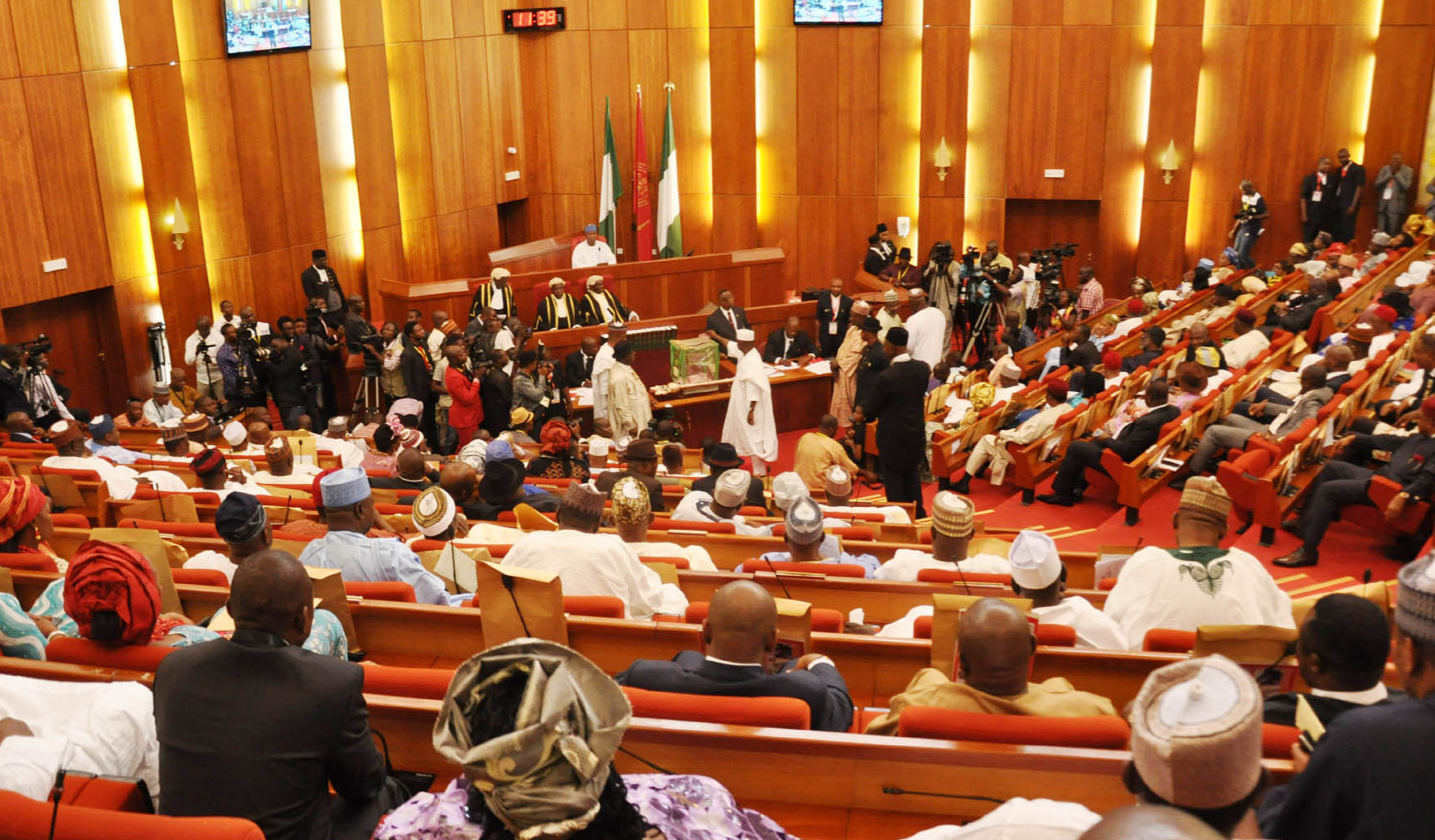Business
CBN Gives New Directive On Lending In Real Estate
Published
3 months agoon
By
Editor
The Central Bank of Nigeria, CBN, has released a new regulatory directive to enhance lending to the real sector of the Nigerian economy.
The directive, issued on April 17, 2024, with reference number BSD/DIR/PUB/LAB/017/005 and signed by the Acting Director of Banking Supervision, Adetona Adedeji, signifies a notable shift in the bank’s policy towards a more contractionary approach.
In line with the new measures, the CBN has reduced the loan-to-deposit ratio by 15 percentage points, down to 50 per cent.
This move aligns with the CBN’s current monetary tightening policies and reflects the increase in the Cash Reserve ratio rate for banks.
READ ALSO: JUST IN: CBN Gov Sacks Eight Directors, 32 Others
The LDR is a metric used to evaluate a bank’s liquidity by comparing its total loans to its total deposits over the same period, expressed as a percentage.
An excessively high ratio may indicate insufficient liquidity to meet unexpected fund requirements.
All Deposit Money Banks are now mandated to adhere to this revised LDR.
The CBN has stated that average daily figures will be utilised to gauge compliance with this directive.
Furthermore, while DMBs are encouraged to maintain robust risk management practices in their lending activities, the CBN has committed to continuous monitoring of adherence and will adjust the LDR as necessary based on market developments.
READ ALSO: JUST IN: CBN Increases Interest Rate To 24.75%
Adedeji has called on all banks to acknowledge these modifications and adjust their operations accordingly. He emphasised that this regulatory adjustment is anticipated to significantly influence the banking sector and the wider Nigerian economy.
The circular read in part, “Following a shift in the Bank’s policy stance towards a more contractionary approach, it is crucial to revise the loan-to-deposit ratio policy to conform with the CBN’s ongoing monetary tightening.
“Consequently, the CBN has decided to decrease the LDR by 15 percentage points to 50 per cent, proportionate to the rise in the CRR rate for banks.
“All DMBs must maintain this level, and it is advised that average daily figures will still be applied for compliance assessment.
“While DMBs are urged to sustain strong risk management practices concerning their lending operations, the CBN will persist in monitoring compliance, reviewing market developments, and making necessary adjustments to the LDR. Please be guided accordingly.”
You may like


JUST IN: CBN Raises Interest Rate to 26.75% Amid Surging Inflation


CBN Resumes Forex Sales To BDCs


Court Dismisses Suit Challenging Arabic Inscriptions On Naira Notes


CAC To Cancel Certificates Of BDCs With Revoked Licences


Court Fixes Date For Ruling On Ex-CBN Boss’ Request To Travel, EFCC Kicks


Witness Reveals How Emefiele Moved Millions To Wife
Business
JUST IN: CBN Raises Interest Rate to 26.75% Amid Surging Inflation
Published
4 days agoon
July 23, 2024By
Editor
The Central Bank of Nigeria, CBN, Monetary Policy Committee, MPC, on Tuesday raised the interest by 50 basis points to 26.75 per cent from 26.25 per cent in May 2024.
CBN governor, Olayemi Cardoso, announced this at a press briefing on Tuesday at the end of the two-day 296th MPC in Abuja.
According to him, the decision to further increase the interest rate is to tackle the country’s rising core inflation and food inflation which stood at 34.19 per cent and 40.87 per cent, respectively in June.
READ ALSO: JUST IN: 58 Countries Back Okonjo-Iweala For Second Term As WTO DG
He said members of the MPC are not oblivious of the need to address the rising prices of food in Nigeria, necessitating the interest rate hike.
DAILY POST reports that the implication of the interest rate hike is that businesses, farmers, manufacturers and investors will have to pay more to get loans from banks.
The 296th MPC meeting is the fourth time the interest rate has been increased since the appointment of Cardoso in September last year.
Recall that in May 2023, when President Bola Tinubu was inaugurated, Nigeria’s interest rate stood at 18.75 per cent while inflation rate stood at 22.41 per cent.
READ ALSO: JUST IN: ADC Reps Member Defects To APC
Meanwhile, despite CBN’s continued interest rate hikes, the country’s inflation has not cooled off.
Earlier analysts had called for a pause in the hike of the interest rate.
The Director of the Centre for Promotion of Private Enterprise, Muda Yusuf, backed call for a pause in the hike of the interest rate.
According to him, the monetary instruments have been overstretched, hence not productive.
“I think we have overstretched monetary instruments because of inflation. They should put a pause on interest rate hikes,” he said.
Business
CAC To Cancel Certificates Of BDCs With Revoked Licences
Published
2 weeks agoon
July 11, 2024By
Editor
The Corporate Affairs Commission (CAC) has said it would cancel the certificates of incorporation of Bureaux De Change(BCDs) whose licences have been revoked by the Central Bank of Nigeria( CBN).
The Nation reported in February the CBN revoked the licences of 4,173 Bureau De Change operators over their failure to meet regulatory guidelines.
In a statement by its acting Director, Corporate Communications, Sidi Hakama, CBN explained that the regulatory provisions flouted include nonpayment of all necessary fees within the stipulated period.
CBN said: “The affected institutions failed to observe at least one of the following regulatory provisions: Payment of all necessary fees, including licence renewal, within the stipulated period in line with the guidelines.
READ ALSO: FEC Steps Down Projects From Past Govts For Review
“Rendition of returns in line with the guidelines; compliance with guidelines, directives, and circulars of the CBN, particularly Anti-Money Laundering, Countering the Financing of Terrorism and Counter-Proliferation Financing regulations.”
However, in line with the above directive by the CBN, the CAC in a notice on its website on Wednesday, said the certificates would be cancelled within three months if the affected companies do not change the names and objects of such companies.
READ ALSO: Actress Joke Silva Celebrates Legendary Husband At 82
“The general public is hereby informed that following the revocation of the operational licenses of 4,173 Bureau De Change companies by the Central Bank of Nigeria vide a Federal Republic of Nigeria Official Gazette (Vol. 111) No. 37 of February 27, 2024 for noncompliance with Regulatory Standards, the Corporate Affairs Commission in the exercise of its powers under section 8(1)(e) of the Companies and Allied Matters Act, 2020 advises these companies to within three months from the date of this publication, change the names and objects of such companies.
“Failure to change the names and objects within the stipulated time frame shall result in cancellation of certificate of incorporation and dissolution. It is to be noted that it is unlawful for a company whose certificate has been deemed dissolved to carry on business,” the CAC notice reads.
Business
FG Suspends Taxes On Maize, Wheat, Rice, Others
Published
3 weeks agoon
July 8, 2024By
Editor
The Federal Government has suspended duties, tariffs and taxes on some essential food items imported through land and sea borders.
Minister of Agriculture and Food Security, Abubakar Kyari, announced this at the National Press Centre, Abuja.
Kyari also said the Federal Government has also inaugurated the Renewed Hope National Livestock Transformation Implementation Committee to develop and implement policies that prioritize livestock development and align with the National Livestock Transformation Plan.
He stated that the listed food items, which include maize, wheat, husked brown rice and cowpeas, will enjoy a 150-day Duty-Free Import Window.
READ ALSO: 10 Safest Countries In The World In 2024
He added that the move is part of the Presidential Accelerated Stabilization and Advancement Plan, which is aimed at achieving food security and economic stability in the country.
According to him: “The Federal Government has announced a 150-day Duty-Free Import Window for Food Commodities, suspension of duties, tariffs and taxes for the importation of certain food commodities (through land and sea borders). These commodities include maize, husked brown rice, wheat and cowpeas.
READ ALSO: Court Orders Buhari’s Minister To Account For N729bn Payment To Poor Nigerians
“Under this arrangement, imported food commodities will be subjected to a Recommended Retail Price (RRP).
“I am glad to reiterate that the Government’s position exemplifies standards that would not compromise the safety of the various food items for consumption.
“In addition to the importation by the private sector, the Federal Government will import 250,000MT of wheat and 250,000MT of maize. The imported food commodities in their semi-processed state will target supplies to the small-scale processors and millers across the country.”

FULL LIST: Those Supporting, Against Aug 1 Nationwide Protest

Religious Leaders Harp On Tolerance At Grassroots Sensitisation Programme In Benin

Act Fast On Oil Spill Rocking Forcados Area, CSOs Task FG, Delta Govt
Trending

 News2 days ago
News2 days agoNationwide Protest: The Killer Is Afraid Of Death [OPINION]

 Metro5 days ago
Metro5 days agoConfusion As Female Passenger Dies In Lagos Keke Marwa

 News4 days ago
News4 days agoJUST IN: Tinubu Sends ₦70,000 Minimum Wage Bill To NASS

 Entertainment4 days ago
Entertainment4 days agoActress Denies Alleged Affair with Senate President Akpabio

 News3 days ago
News3 days agoPAP: Again, Otuaro Meets Stakeholders, Re-emphasises Importance Of Collaboration

 Headline3 days ago
Headline3 days agoBREAKING: SGF, NSA, Ministers In Emergency Meeting Over Planned Nationwide Protest

 Politics2 days ago
Politics2 days agoPlace Obaseki On Security Watch List, Edo APC Urges FG, As State Govt Kicks

 News2 days ago
News2 days agoBREAKING: INEC Can Handle Local Government Elections, Says Chairman Yakubu

 News4 days ago
News4 days agoJUST IN: Senate Passes Minimum Wage Bill From N30,000 To N70,000

 Headline4 days ago
Headline4 days agoElon Musk Opens Up About His Transgender Child

































